Joe Kennedy III Wants You to Know He’s More Than Just a Name
The inside story of his controversial quest to be Massachusetts’ next Senator Kennedy.
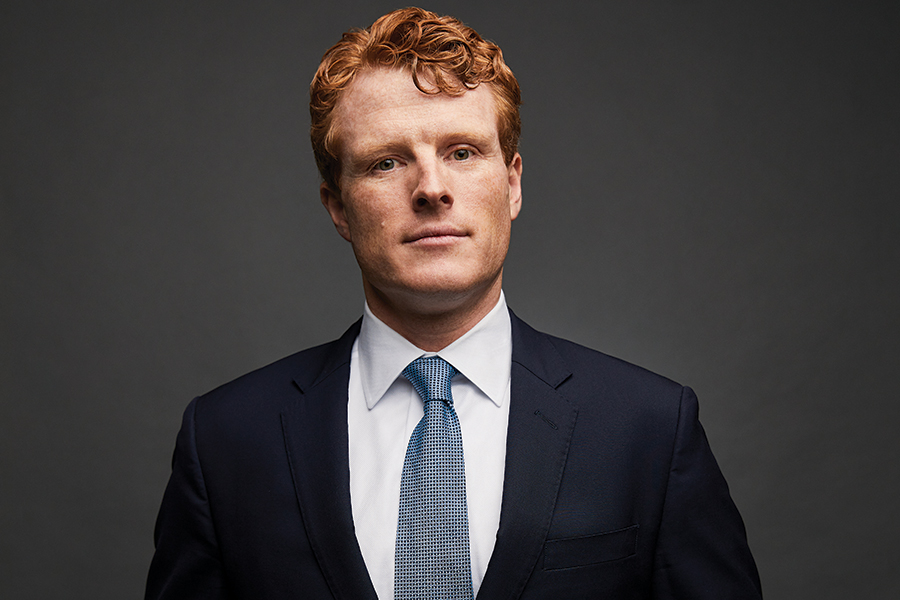
Photo by Ken Richardson
On a normal day, the meeting hall in Middleton’s Flint Public Library is so empty and quiet, you can hear a bookmark drop. On a chilly afternoon in early February, though, the room looked like it had suddenly become the hottest spot in town, packed to capacity with politically engaged baby boomers eagerly awaiting an appearance by Massachusetts’ political man of the moment: Joe Kennedy III. Holding court at the front of the room beside a welcome table decked out with campaign signs, Essex County District Attorney Jonathan Blodgett began by excitedly ticking off the many reasons he is “enthusiastically and without reservation endorsing” Kennedy in his campaign to unseat his fellow Democrat, U.S. Senator Ed Markey.
“We want someone who’s smart, someone who has empathy, someone who’s committed, someone who’s honest,” Blodgett said. “Check, check, check, check.”
The crowd broke out in hearty applause.
As Blodgett heaped praise on the 39-year-old candidate, the man himself leaned against a wall several feet away. Of all the famous Kennedys, JK3 looks most like his grandfather, Bobby. Tall and lean, he has the same eyes and high cheekbones, and even wears his hair in the same style: parted to the left and a little floppy, but not unkempt. The only difference is that instead of inheriting the usual Kennedy shade of chestnut brown, his hair is Doritos orange. As Blodgett went on, Kennedy wasn’t exactly shrinking from the praise, but he wasn’t gloating either. His smile looked just one degree away from something you could describe as bashful.
When Kennedy took the stage, his stump speech was as self-effacing as his stance in the back of the room. “My name’s Joe,” he said. “Hopefully some of you knew that. I’ve got a twin brother named Matt” who was born first. “He likes to say the eight minutes separating us at birth were the greatest eight minutes of his life.” The crowd laughed. This line always works, and not just because it’s funny, but because everyone is always eager to be let in on an intimate Kennedy family joke.
This town hall, like so many Kennedy events, went off without a hitch. The congressman, although not a natural charmer from behind the podium, wins over most crowds. Part of it is his innate assets—he’s young, handsome, and brilliant. Part of it is the calming, though oddly syncopated, way he speaks (like a man who has watched a lot of Obama speeches). And part of it, of course, is his electric last name. It can charge any event, any handshake, and any election with an excitement most politicians spend their careers trying and failing to incite. To be at an event with a Kennedy running for a seat in the Senate, after all, is to come into contact with a living piece of American lore.
On his way out the door, Kennedy shook hands with everyone who lined up—from the mayor of Salem, Kim Driscoll, who is a steadfast supporter, to a local dentist who just wanted to meet the young congressman. Selfies were had. Everyone was smiling. Then, when he was mere seconds from a clean getaway, a Democratic activist named Hannah Bowen approached. “I’m excited to support you in the long haul,” she said. “But I’m still debating about this race.”
Bowen is far from the only one who likes Kennedy but isn’t sold on supporting his primary challenge of Markey, a popular and effective progressive legislator who has served in Washington since the Gerald Ford administration. Markey seemed on his way to an easy reelection—until last September, when Kennedy announced he would campaign to take the incumbent’s seat. The decision caused an uproar in the Democratic political establishment. At a time when all Democratic fire should be trained on Donald Trump, the thinking went, what was Kennedy doing picking an intraparty fight?
“I don’t get the strategy,” Bowen told him now.
Kennedy struck me as less than eager to explain himself. In a campaign that has otherwise gone smoothly, this question of “Why?” has dogged him. Although he and surrogates such as Blodgett have no trouble arguing that he is an effective and virtuous public servant, his campaign has failed to satisfactorily explain precisely the reason voters should boot Markey out of office and install Kennedy in his place—and political insiders have taken notice. “There isn’t a single syllable in there that is a reason to vote for Joe Kennedy over Ed Markey,” wrote political columnist Charles P. Pierce (a Kennedy constituent himself) after Kennedy made the case for his candidacy in a debate. “So far, Mr. Kennedy has not articulated a good reason why voters should vote for him over the incumbent,” opined The Economist in its tart, understated tone. “I just don’t get why Joe is taking him on,” an elder statesman of Massachusetts politics told me.
Now, standing outside the Middleton library’s front doors, Kennedy was faced with the very same question from a flesh-and-blood voter. “So, the short, um…” Kennedy paused. “Ali, where’s the car?” he asked an aide, a note of urgency in his voice.
Reaching the vehicle, Kennedy turned toward Bowen and responded. “There is an awful lot of opportunity that comes with being a senator from Massachusetts,” he said, “and with due respect to Senator Markey, who is a good man, there’s more to this job than the way you vote and the bills that you file. It comes with an ability to leverage that platform to address the issues we’re talking about and, with due respect to the senator, if you’re not going to leverage that now, given what is at stake for the Democratic Party, for the values that we hold dear in our commonwealth, that have been targeted by this administration literally from day one, if you’re not doing it now, then when?”
Kennedy’s response seemed to leave Bowen flat. And in that moment, it struck me as strange that half a year into this campaign, Kennedy had not honed a home-run answer to the central question of his candidacy. It is odder still considering the kind of risk he has assumed by running.
To take on Markey, Kennedy had to give up the chance to run for reelection in the House, a race he would have been virtually guaranteed to win. Now, if he loses—and polls show the Senate race is tight—he’ll be out of government entirely by next January. Making matters worse, his decision to challenge Markey has alienated so many key members of the Democratic establishment that he is risking his standing in the party, not to mention his legacy. And it’s not just his own career that is at stake. He may be betting his family’s name as well. “A Kennedy has never lost a race in Massachusetts,” says Thomas Whalen, a Boston University historian who has studied the family. “If Joe Kennedy loses this race, the dynasty is over.”
Carrying his family’s legacy into this race has been both a blessing and a curse. It has opened him up to a damaging line of attack: that he is entitled and using his name to tilt the race unfairly in his favor. (“Kennedy is ready to be a Kennedy,” scoffed Slate columnist Jim Newell.) But it also provides him with that most valuable of political commodities—100 percent name recognition—and a less measurable, but perhaps even more potent, political substance: romance. The unique challenge Kennedy faces now (and, frankly, every day of his life) is convincing the world that he’s far more than just a name.
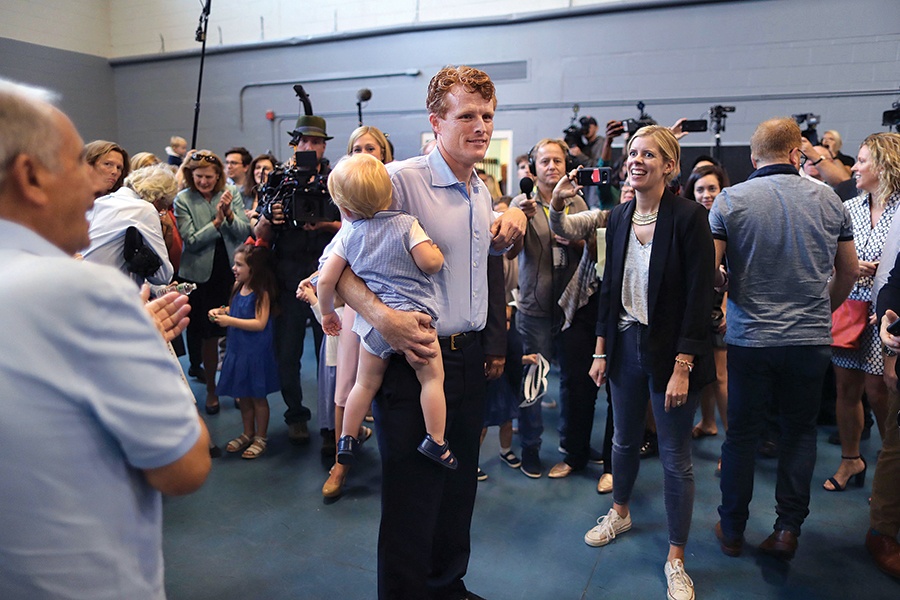
The candidate holding the next generation, his son, in his arms. / John Tlumacki/The Boston Globe via Getty Images
In February, before the coronavirus ended interpersonal contact—and political rallies—I spent some time with Kennedy on the campaign trail. One Sunday morning, we met at the congressman’s Newton home and piled into a small SUV along with two young staffers for a marathon day of campaigning. The goal was to crisscross eastern Massachusetts and hit up town halls, receptions for supporters, and even a funeral for a prominent official from an allied labor union along the way. We were about halfway to a rally for campaign volunteers in Dorchester when I popped the question:
“Joe, can I ask you some of the, uh, mandatory ask-Joe-Kennedy questions?”
“Go for it,” he said.
“Why don’t you drink?”
He burst into laughter. “Talk about mandatory questions.”
Kennedy—who is famously a teetotaler—told me that in high school he watched friends experiment with alcohol. “Candidly,” he said, “it didn’t look like that good a time.” Although he was a regular at jock parties in college at Stanford (he was his club lacrosse team’s starting goalie), he felt drawn to other social activities. “Whether it was skiing or just going out to breakfast,” he explained, “there were plenty of other things to do that seemed more fun than sleeping off a hangover.”
It makes sense, but considering that Kennedy’s decision not to drink stands out in the context of his family’s long line of playboy politicos, I felt compelled to ask the obvious: “Does your family history factor into it?”
He paused. “I’m sure it did at some point,” he said. “Just understanding that there are good people, you know—close friends or family—who have had their struggles, sometimes it’s better not to even allow that to get started.”
If there’s one word that most people who know Kennedy use to describe him, it’s “careful.” They don’t mean he’s averse to risks—after all, running for Markey’s seat is a colossal one—but he pursues them deliberately. So for Kennedy, when it comes to drinking, the risk/benefit analysis has never added up.
Reasonable people may wonder if there is more to it. Did dreams of politics push him to refrain from drinking? Did potential drunken escapades pose too big a risk to his future? By all accounts, however, through high school, college, and most of his twenties, Kennedy had not decided whether he would one day run for office. “It was not preordained,” his brother, Matt, says. “It’s not like from age eight he was thinking, ‘I have to be in Congress.’”
Peter Munzig, a college friend of Matt’s and Joe’s, says that at Stanford neither of the twins had set his sights on politics and that Joe was not even especially politically engaged. In fact, it was not clear to friends which of the brothers was more likely to enter the family business. Sure, Joe had the name, passed down from the patriarch, Joseph Kennedy, to Joe and Matt’s father, Joseph Kennedy II, and finally to JK3 himself. But Matt was more naturally gregarious. “I might enjoy going out more than he does,” Matt tells me. “I’ll leave it at that.” (Attentive readers might notice there’s a generation missing in that succession; in fact, Joseph Kennedy had a son, Joseph Jr., who died in a World War II plane crash before having children, so the name passed to Joseph Sr.’s oldest grandson, Joe and Matt’s father.)
Joe II never pushed his sons into politics, and they didn’t have to wonder why. Although he had a productive career in Congress, serving from 1987 to 1999, his time in Washington wreaked havoc on his marriage. Soon after his political career began, Joe and his wife, Sheila Rauch, separated and the boys moved from the family home in Brighton to live with their mother in Cambridge. All members of the family attribute the collapse of the marriage to the strain of constant travel to Washington and the stresses of the job.
Watching politics devastate his parents’ relationship made Kennedy even more wary of running for office. But the two men—Joes II and III—are very different. Joe II is more outgoing than his son, perhaps a more natural retail politician. “He’s a strong personality,” Kennedy says of his father. He is also quite a bit messier. After divorcing Sheila, he wanted to marry his secretary, Beth Kelly. So he did what any upstanding Catholic in the early 1990s did: He sought an annulment to invalidate his previous marriage. Only he didn’t tell his ex-wife. She found out by certified letter from the Archdiocese of Boston while her husband was in the Caribbean with Kelly. After receiving the news, she locked the door to her bathroom and threw up.
By some accounts, the divorce molded Joe in his mother’s image. “Keep in mind, he was not raised really within the Kennedy family universe,” says Jon Keller, a CBS Boston political analyst. “He was raised by his mother, who is a quieter person with excellent manners. Unlike his father, who was very brash and kind of aggressive, and unlike Ted [Kennedy], who, you know, was kind of boisterous, Joe is as humble and sweet as can be.”
As a teenager, Kennedy attended Buckingham, Browne & Nichols, a prestigious private day school in Cambridge, where he excelled. “The school had very high expectations for students and student success,” says Will Droste, a friend of Kennedy’s from B B & N. “I know a lot of people felt like it was almost too stressful, but Joe wasn’t in that boat.” At Stanford, where Kennedy studied management science and engineering, he was social but kept his head down when it mattered. “It was work before play,” Munzig notes. And he stayed out of trouble. “There’s tons of guys on that lacrosse team who I could give you intel on,” Munzig says, “but there’s nothing about Joe.”
After college, Kennedy joined the Peace Corps (an organization created by his great-uncle’s administration) and served in the Dominican Republic before enrolling at Harvard Law. When he graduated in 2009, he worked as an assistant district attorney, first on the Cape, where he had summered as a child, and later in Middlesex County. Kennedy says that when he pictured his future, it did not include politics, at least not anytime soon. But intentionally or not, he had spent his twenties crafting a damn good political résumé even beyond the weight of the name at the top. The decision of whether to enter politics or lead a quiet life—where his name would not be an asset or a responsibility, but merely a curiosity—was solely his to make.
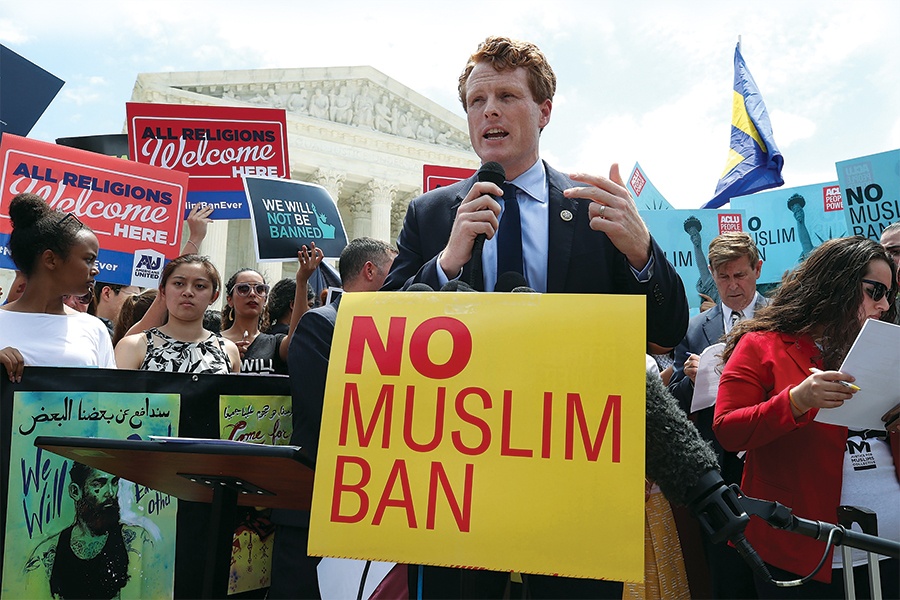
A rising liberal star on the national stage, Kennedy is handsome, hardworking, humble, and the spitting image of his grandfather, Bobby. / Photo by Mark Wilson/Getty Images
In 2011, Kennedy was in a Cambridge courtroom for a meeting about an upcoming case when his cell phone rang. As was so often the case, the caller ID read “Matt.” Kennedy answered.
“Barney Frank just retired,” his brother said breathlessly. The longtime congressman had announced he would not seek reelection in the 4th District.
“Well, why would I care?” Kennedy asked.
“Think about that for a second,” Matt replied.
Throughout their twenties, Matt had become convinced that Joe should run for office. Why not Matt himself? After all, Matt’s no slouch: He worked in the White House counsel’s office and at the Treasury Department during the Obama administration. But between them, Matt says, Joe is the more “serious” brother, adding that Joe is also “probably more thoughtful and a harder worker than I am.” Now, the opportunity to run for office had finally arrived.
In the ensuing days, a familial tug-of-war played out. Matt tried to convince his brother to enter the race to succeed Frank, while their father urged caution, saying, “‘Listen, if you’re doing this because you think you should or because you think it’s the family business, then this is going to be a brutal, brutal mistake,’” Kennedy recalls now. “‘If you do not personally want to do this, if there’s not a burning desire, then you’re going to hate it, and if you hate it people are going to be able to tell.’ He pushed me really hard not to do it.” It was good advice, Kennedy says, forcing him to prove to himself and to his family that he wanted to run for the right reasons. Next, he had to convince voters to elect him for the right reasons, too, and that he was more than just a pretty face with a regal name.
Kennedy knows better than to complain that he can never quite outrun the long shadow of his lineage. But you can tell that just below the surface he bristles, ever so slightly, at never being regarded purely on his own terms. “I have been told that everything I have ever done is only because of my last name,” he says. It’s true that his name can seed doubt about any item on his list of accomplishments. Kennedy is a Stanford- and Harvard-educated lawyer (did he get in because he’s smart or because of his name?) who devoted a good chunk of his twenties to public service in the Dominican Republic (does he have a heart of gold or was he polishing his political résumé?) before a brief but successful career as an assistant district attorney (did he advance because of his legal skills or because his bosses were starstruck?). Nowhere, though, is that question more prevalent than in politics: Did Kennedy win 90 percent of the vote in the primary for Frank’s seat and then go on to beat his Republican opponent because voters liked him, or because they wanted so desperately for his family’s dynasty to continue?
When Kennedy arrived in Washington, the weight of his name forced him to make a choice most freshman representatives don’t have to consider: Should he fall into the role of a young backbencher—grinding out years of constituent service and behind-the-scenes policy work—or embrace his political celebrity and stride onto the national stage? Deftly, Kennedy chose to do both. Over the past eight years in Congress, he has come to be known as a policy workhorse and a go-getter, and that has made him a potent political actor. Soon, party elders began to contemplate much bigger things for him. This couldn’t have been clearer than it was on January 30, 2018: Minutes after Donald Trump concluded his first State of the Union address, Kennedy strode to a lectern on the floor of an auto shop in a Fall River vocational high school, national TV cameras fixed on him, to deliver the Democrats’ response to the president’s speech—a major honor reserved for a party’s most promising politicians. Afterward, he spent the next nine months wielding his name and national reputation to help elect Democrats in the midterm elections in an effort to reclaim a majority in the House. When the campaign succeeded, Kennedy deserved a share of the credit.
He was clearly a star, admired by older members of the establishment, the young class of moderates, and progressive insurgents alike. Plus, he was viewed as humble and reserved, using his name to benefit the party and not himself. There were even whispers that he could be a future speaker of the House. All he had to do was keep his head down, play by the rules, and wait his turn.
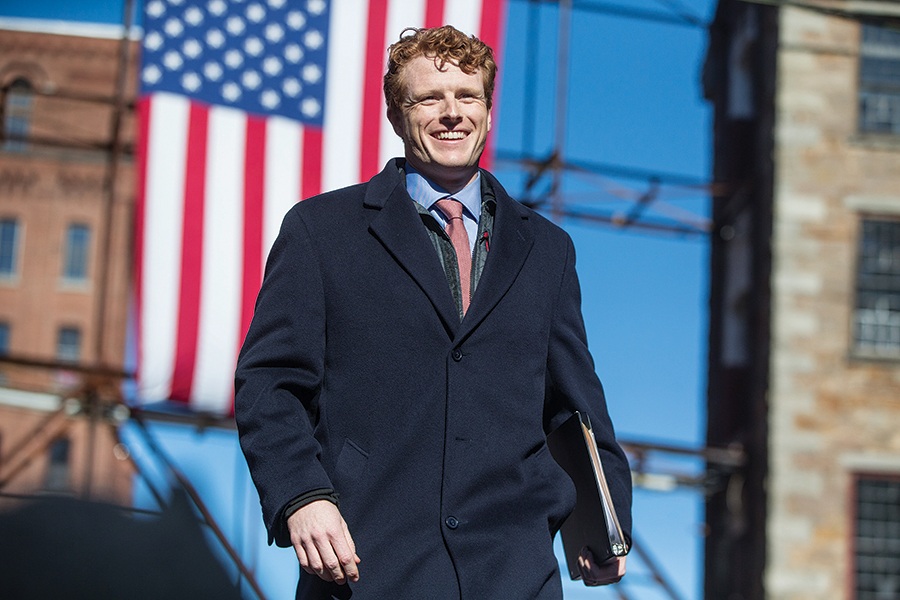
Photo by Scott Eisen/Getty Images
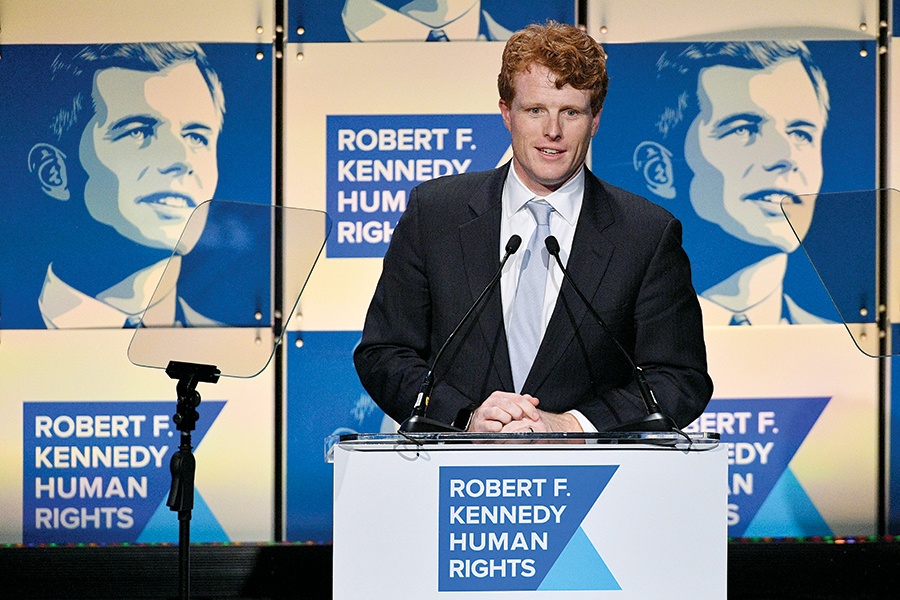
Photo by Dia Dipasupil/Getty Images
It was raining when Kennedy and I pulled up to Relief’s In, a firefighters’ function hall in Lawrence, for a town hall. Rolling up his sleeves, he hopped out of the car and strode toward a crowd of union construction workers wearing Carhartt hoodies and Patriots beanies and chanting, “Let’s go Joe!”
Kennedy was quickly swallowed up by the crowd. When it parted, there he was again, in the center, posing for a photo with two dozen delighted supporters all waving campaign signs above their heads. At stop after stop it was more of the same. People love Kennedy.
But inside the Democratic party establishment—his most natural allies—there’s significantly less adoration for the candidate these days. It all started last summer, when signs emerged that Kennedy was considering a run for Markey’s seat. First, a poll was conducted asking Massachusetts voters whom they’d support in a hypothetical matchup—and no one could figure out who was paying for it. Then, in August, the New York Times quoted an anonymous source saying Kennedy was “considering” challenging Markey. Weeks later, Kennedy climbed onto a soapbox at an East Boston community center and made it official: He was gunning for Markey’s seat.
Democrats were stunned. As a general rule of American politics, contested primaries occur only when the two candidates stand on opposite sides of an ideological fault line or when the incumbent is weak. “Usually there has to be something glaringly wrong with the incumbent to open the door for a challenger,” Keller says. “And there’s nothing wrong with Ed Markey’s performance.” An analysis published by the University of Virginia’s Center for Politics put it bluntly: “Welcome to the most unusual Senate primary in decades.”
Perhaps no one was more surprised than Markey himself. “He thought [he and Kennedy] had a very strong relationship,” says Steve Tocco, head of the prestigious lobbying firm ML Strategies and a longtime friend of and adviser to Markey. “He said, ‘I helped Joe a lot when he first came down here.’ But he sucked it up and said, ‘Okay, it’s gonna be a tough campaign.’”
Not long after Kennedy’s announcement, influential Democrats and activists rallied to Markey’s side and expressed their ire at Kennedy’s decision to a Globe reporter. “I think it’s bad for [Kennedy],” New Hampshire Senator Jeanne Shaheen said. “I think it’s bad for the party.” Craig Altemose, a leading Massachusetts climate activist, didn’t mince words, either, saying, “[It] seems like it’s just a move that is primarily driven by ego and ambition instead of a thirst for justice.”
In some ways, observers argue, Kennedy’s move only highlights how much of a Kennedy he really is. “There’s a natural sense of entitlement that accompanies dynastic heirs, and this can be seen in the political ambitions of Kennedys,” says Kitty Kelley, a journalist who has written extensively about the family. She points to Senator Ted Kennedy’s primary challenge to President Jimmy Carter in 1980 as an excellent example.
Other party insiders worry that Kennedy is doing precisely the wrong thing at a pivotal moment in history. “Our major task is to get this screwball out of the White House,” former Governor Michael Dukakis told me, “and Joe could be extremely helpful in doing that. He’s one of the few people, frankly, who can have that national influence. He can get you votes in Iowa. He can get you votes in Texas. He’s got a connection to young people. I would love to see him out there campaigning for [Joe] Biden. But he’s not going to be able to do that because he’s in the middle of this thing.”
In any case, suggestions that Kennedy’s decision to run reveals a sense of entitlement, or that his candidacy is viable only because of his last name, really get under his skin. “I think what is entitled,” he told me, “is the idea that if you happen to hold a seat that you should not expect a challenge because you are entitled to reelection without having to go out there and make your case. Now Senator Markey has never said that, and I don’t think he believes that, but those folks who are making that criticism apparently do.”
The condemnation of Kennedy, meanwhile, has been far from universal. Younger Democrats, especially moderates who swept into office in 2018, have broken in his favor and endorsed him. (Ayanna Pressley has, notably, stayed out of it.) Still, overnight it seemed that Kennedy had sacrificed much of the goodwill and political capital he’d built over the past eight years as the Democrats’ Golden Boy.
It is almost tempting to feel sorry for Kennedy. Had he just been a good representative from Massachusetts with the last name of Smith, aiming for higher office and potentially screwing Markey along the way, would anyone really have cared? In fact, Markey had two challengers before Kennedy threw his hat in the ring and no one said a thing about it. Had the party not made Kennedy a national star on the weight of his name, would anyone complain that he was campaigning for himself and not turning out votes for Biden? Yet at the same time, how can anyone really feel too sorry for a Kennedy running for office?
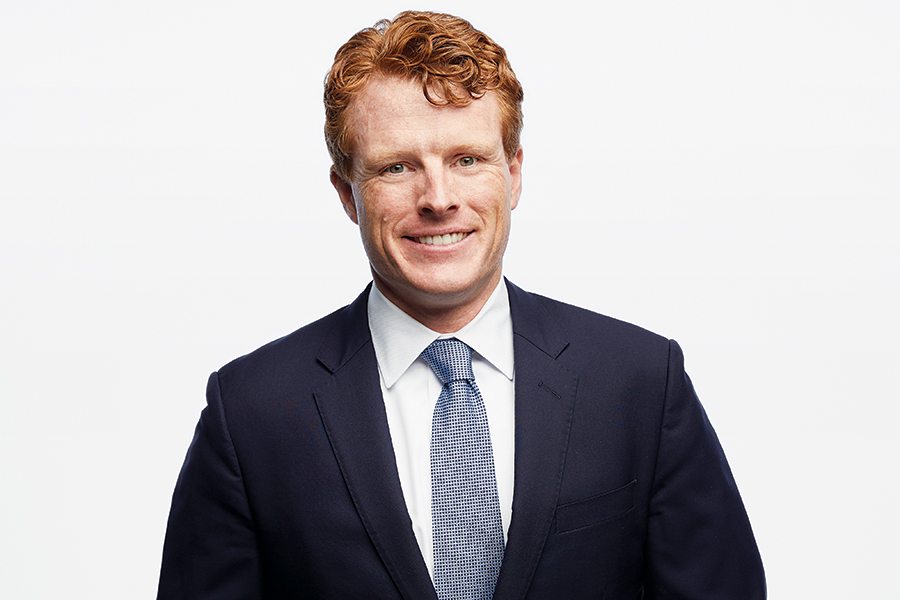
After the September 1 primary, Kennedy will either be out of elected office entirely or well on his way not just to a seat in the Senate, but to being one of the party’s youngest and most promising politicians with virtually limitless potential. / Photo by Ken Richardson
In February, as Kennedy and I drove away from the public library in Middleton after his exchange with activist Hannah Bowen, he made what is perhaps the most substantive pitch for why he is running that I have heard so far. He couched it in terms of a politician’s responsibility not only to wield political power, but also to accumulate it—for himself and his party.
In a time of Republican control of the Senate, he said, backroom legislative skills—which Markey has in spades—are not enough. “In these circumstances,” he said, “a senator’s job is to go out there and campaign for other people, it is to go build the bench, to keep the House, to flip the Senate, to flip the presidency.” A senator has a much bigger platform than a congressman, he explained, and Markey is not adequately utilizing his platform in the way that a Senator Kennedy would.
Herein lies Kennedy’s greatest contradiction. On one hand, the reason he could use the platform better is precisely because he is a Kennedy. At the same time, he is asking us not to vote for him simply because of his name. It seems like he wants it both ways. Unless, that is, this isn’t the real reason he’s running.
That’s the conclusion I came to after trying, and ultimately failing, to accept his explanation. The risks he has assumed just seem too big—and the brutality of knifing Markey too great—for this all to be about the incremental difference in platform size between the Senate and the House. I’m far from the only one who has puzzled over his motivations. “There has to be a political reason,” Tocco told me, “and I haven’t been able to figure it out.”
In the absence of convincing explanations, speculation has filled the void. One hypothesis goes like this: Six years from now Kennedy could face powerful opponents such as Pressley or Maura Healey in a race to replace Markey after he retires. Better to take a clean shot at Markey now, rather than compete in a crowded and more diverse field later on.
The other line of whispered speculation is that Kennedy may have his eye on an even bigger prize than the U.S. Senate. Last spring, as the Democratic presidential primary field was taking shape, Kennedy allies urged him to run for the nomination. He had national name recognition, progressive bona fides, strong support within the party, and youth. He even had the foundations of a presidential campaign platform: He had just introduced a political program he called “moral capitalism”—a Warren-esque reimagining of our free-market system with a little less revolutionary zeal. He seemed to have all the pieces.
Still, he declined. He feared that entering a race for president in his thirties, when many voters outside Massachusetts still didn’t know him on his own terms, would amount to purely trading on his name. “You would essentially be making an overt, calculated decision to leverage that for your own gain,” he says. Voters, he adds, need the chance “to actually get to know me and vet me and understand that if you vote for me, you’re not going to get Jack, Ted, Bobby, or my dad. You’re gonna get me.”
When I asked him, point blank, if he was after the Senate platform in 2020 to get that chance to introduce himself to the American public at large for a presidential run sometime in the future, he said that, at the moment, he is focused only on the job at hand. Whatever his true reasons may be, the one certain thing is that Kennedy, somewhat uncharacteristically, has rolled the dice. On primary day, September 1, he will either crash out of elected office—just after alienating some of the most powerful figures in Democratic politics—or he will emerge as one of the most promising figures in the party, with virtually limitless potential.
At the campaign stop in Lawrence, like every rally I went to with him, the room was filled to capacity with people who wanted to catch a glimpse of the Kennedy mystique. As the candidate took to the podium, I found a spot against the wall in the back of the hall where I could listen. A key feature of Kennedy’s campaign strategy is to meet with voters on their own turf in every corner of the state, and in Lawrence that meant delivering his remarks in Spanish. It’s been a while since Kennedy was in the Peace Corps in the Dominican Republic, and he warned me before we arrived that this performance might turn into a dumpster fire. When he began his speech, he stuttered, then tripped over a few words. His aides held their breath. I began to think his prediction was about to come true.
But then, suddenly, his speech spilled out. Too quickly? Yes, and with a grammatical error here and there, but fluently and with ease. I could feel the energy in the room shift. Soon enough the mostly Dominican-American crowd was asking him questions about his time in the DR. He made inside jokes that everyone in the audience, but almost no one on his staff (except one aide who is from the DR), understood. A grandmother took the mike to ask him an important question about his time in the country: “¿Tuviste novia en Santo Domingo?” (“Did you have a girlfriend in Santo Domingo?”) When he coyly declined to answer, the crowd erupted in hysterics.
I found this all to be a vaguely dissociative experience. Here I was, watching the spitting image of all those other Kennedys I had seen deliver rousing speeches on grainy footage, yet he was cracking jokes in Spanish with a Caribbean (and, yes, also gringo) accent. He seemed so much more accessible, less guarded—and less traumatized, perhaps—than his mythologized forebears. And yet, he is unmistakably a Kennedy, and the crowd can feel it.
For many observers, this race is a test not only of this Kennedy but of the Kennedy dynasty’s relevance in 2020. From JFK to the man standing before this room in Lawrence, the Kennedy name has carried three generations of politicians into long and fruitful careers, but it has been less potent this century, leading some to wonder if it is on the way out. That’s why if Kennedy loses, Whalen, the historian, believes the story of the Kennedys in American politics will at long last be over.
Here’s the flip side I began to consider in Lawrence, though. If this Kennedy—this sober, self-effacing, Spanish-speaking, orange-haired Kennedy—does become our next senator, it just might mark the dawn of a new era for the dynasty, retooled and reimagined for the 21st century. In Massachusetts, after all, who doesn’t dream of a new Camelot?


